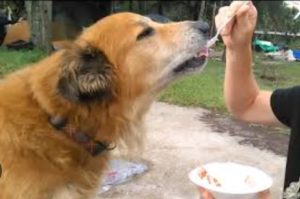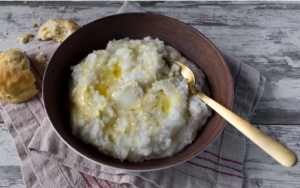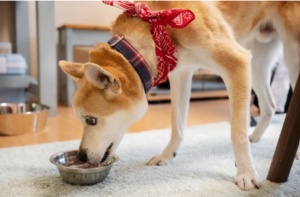As dog owners, we all want to provide the best possible nutrition for our furry friends. Sometimes, it’s tempting to share human foods with our dogs, especially when they seem curious about what we’re eating. One such food is grits, a popular dish in many households. But can dogs eat grits? Are grits safe for dogs, or do they pose any risks? In this detailed guide, we’ll explore everything you need to know about feeding grits to dogs, including the risks, benefits, and how to safely incorporate them into your pet’s diet.
What Are Grits?

Grits are a traditional Southern dish made from ground corn (usually hominy or cornmeal). They are typically boiled and served as a breakfast side dish, either plain or flavored with butter, salt, cheese, or other seasonings. Grits are rich in carbohydrates and have a creamy texture, making them a comforting and filling meal for humans.
However, what is nutritious and tasty for humans may not always be safe for dogs. Let’s dive into whether grits can be a suitable addition to your dog’s diet.
You may love this one: Can Dogs Eat Pinto Beans?
Are Grits Safe for Dogs?

The short answer is: plain grits in moderation are generally safe for dogs, but they should not be a regular part of their diet. The key factor here is how the grits are prepared and what ingredients are added.
Safe:
- Plain, unsalted grits (without butter, salt, or other additives) are not toxic to dogs.
Unsafe:
- Flavored grits that contain butter, salt, cheese, garlic, or onions are harmful and should be avoided.
- Instant grits often contain preservatives and artificial flavors that are not healthy for dogs.
Nutritional Profile of Grits
Here is a basic breakdown of the nutritional content of plain grits:
| Nutrient |
Amount (per 1 cup cooked) |
| Calories | 151 |
| Carbohydrates | 31g |
| Protein | 3.4g |
| Fat | 1.5g |
| Fiber | 1.4g |
| Sodium | 0mg |
While grits are a good source of carbohydrates, they lack essential nutrients like protein, healthy fats, vitamins, and minerals that dogs need for a balanced diet. Therefore, grits should never replace a dog’s regular meals.
Risks of Feeding Grits to Dogs
While plain grits are not toxic to dogs, there are some potential risks associated with feeding them to your pet:
-
High in Carbohydrates
Grits are primarily composed of carbohydrates. Feeding your dog too many carbs can contribute to weight gain and obesity, especially if your dog is not very active.
-
Digestive Issues
Dogs’ digestive systems are not designed to process large amounts of grains. Consuming too many grits can cause digestive upset, including diarrhea, gas, and bloating.
-
Potential Allergies
Some dogs may have a corn allergy or sensitivity. If your dog has shown signs of food allergies, such as itchy skin, ear infections, or gastrointestinal issues, it’s best to avoid feeding them grits.
-
Added Ingredients
Most grits recipes include ingredients like butter, salt, cheese, and seasonings, all of which can be harmful to dogs. These additives can lead to salt poisoning, pancreatitis, and other health issues.
Benefits of Feeding Grits to Dogs (in Moderation)

When given in small amounts and without any harmful additives, plain grits can provide some minor benefits to dogs:
-
Energy Boost
Grits are a good source of carbohydrates, which can provide a quick energy boost for active dogs.
-
Fiber Content
The fiber in grits can help support healthy digestion in dogs, especially those who struggle with constipation.
-
Low in Fat
Plain grits are naturally low in fat, making them a safer occasional treat for dogs who need to manage their weight.
How to Safely Feed Grits to Dogs
If you decide to give your dog grits, follow these guidelines to ensure it’s done safely:
- Serve Plain Grits: Only give your dog plain, unsalted, and unseasoned grits. Avoid instant grits or any flavored varieties.
- Small Portions: Serve grits in small portions as an occasional treat. Start with a tablespoon to see how your dog reacts.
- Monitor for Allergic Reactions: Watch for any signs of allergic reactions, such as itching, vomiting, or diarrhea. If your dog shows any symptoms, stop feeding them grits immediately.
- Avoid Regular Feeding: Grits should never be a regular part of your dog’s diet. Stick to a well-balanced dog food for their primary nutrition.
Can Puppies Eat Grits?
Puppies have more sensitive digestive systems than adult dogs. It’s best to avoid feeding grits to puppies until they are older and can handle more complex foods. Stick to puppy-specific food that meets their nutritional needs.
What to Do If Your Dog Eats Flavored Grits
If your dog accidentally eats flavored grits that contain harmful ingredients like butter, salt, or garlic, take the following steps:
- Monitor Your Dog: Watch for signs of digestive upset, such as vomiting, diarrhea, or lethargy.
- Provide Fresh Water: Ensure your dog has access to plenty of fresh water.
- Contact Your Veterinarian: If your dog shows any concerning symptoms, contact your veterinarian for advice.
Healthy Alternatives to Grits for Dogs
If you want to share a snack with your dog, consider these healthier alternatives:
- Cooked Brown Rice: A better source of carbohydrates and fiber.
- Plain Oatmeal: Provides fiber and is easy to digest.
- Sweet Potatoes: Packed with vitamins and fiber.
- Pumpkin: Great for digestion and low in calories.
Frequently Asked Questions
Can dogs eat instant grits?
No, instant grits often contain preservatives, artificial flavors, and high levels of sodium, which can be harmful to dogs.
Are grits better than rice for dogs?
Cooked plain rice is generally a better option for dogs. It’s easier to digest and less likely to cause allergies or digestive upset.
How much grits can I give my dog?
If you decide to give your dog grits, start with a small amount—about one tablespoon for small dogs and two tablespoons for larger dogs. Monitor their reaction before offering more.
Conclusion: Should You Feed Grits to Your Dog?
So, can dogs eat grits? Plain grits in small amounts are generally safe for dogs, but they should not be a regular part of their diet. Always avoid flavored or instant grits, as they can contain harmful ingredients. If you want to give your dog a treat, consider healthier alternatives like cooked rice, oatmeal, or sweet potatoes.
Remember, your dog’s health should always come first. When in doubt, consult your veterinarian before introducing new foods into your dog’s diet.
